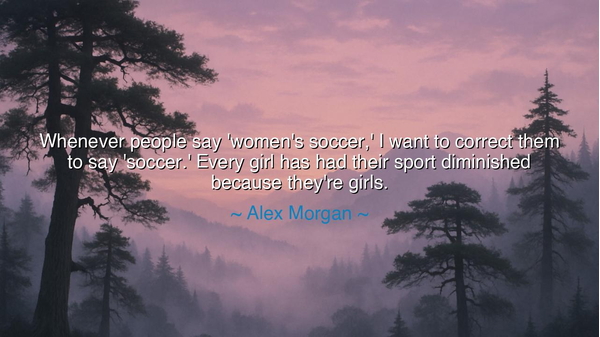
Whenever people say 'women's soccer,' I want to correct them to
Whenever people say 'women's soccer,' I want to correct them to say 'soccer.' Every girl has had their sport diminished because they're girls.






The words of Alex Morgan strike against the chains of language itself: “Whenever people say ‘women’s soccer,’ I want to correct them to say ‘soccer.’ Every girl has had their sport diminished because they’re girls.” Here she names the injustice hidden not in laws, but in words. By marking a woman’s game as lesser, by qualifying it where men’s is left unmarked, society plants the seed of diminishment, whispering that women’s effort is imitation rather than equal triumph.
This is no small matter, for words shape worlds. The ancients knew that names carry power: to name a thing wrongly is to wound its spirit. By speaking of soccer for men and “women’s soccer” for women, the world has long declared one the standard and the other an exception. Morgan demands the reversal of this spell, that language may restore what it has stolen—the dignity of recognition without diminishment.
History reveals how such patterns have endured. When Billie Jean King defeated Bobby Riggs in the “Battle of the Sexes” in 1973, it was more than a tennis match; it was a war against the idea that women’s sport was novelty. In her victory, she showed that women’s athleticism stood on its own, needing no apology or lesser prefix. Yet even decades later, Morgan reminds us, young girls still inherit the sting of being told their game is somehow “different.”
The truth is clear: the sweat of the woman athlete is no lighter, her sacrifice no less, her triumph no smaller. When she trains, she trains as fiercely; when she plays, she plays as passionately. To call her game anything less than the game itself is to betray her labor and to teach generations of girls that they compete not on equal ground, but in shadows. Morgan’s cry is to strip away this illusion, to let the name be pure: soccer.
So let this teaching endure. Do not diminish the labor of women by qualifying what should be unqualified. In the stadiums and on the fields, in the courts and on the tracks, the contest is real, the struggle is true, the spirit is indomitable. Call it not “women’s soccer,” but soccer; not “women’s sport,” but sport. For the greatness of an athlete is not measured by gender, but by the fire of the heart—and that fire burns the same in all.






AAdministratorAdministrator
Welcome, honored guests. Please leave a comment, we will respond soon